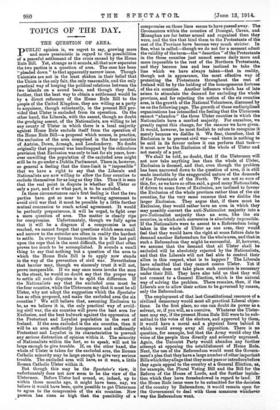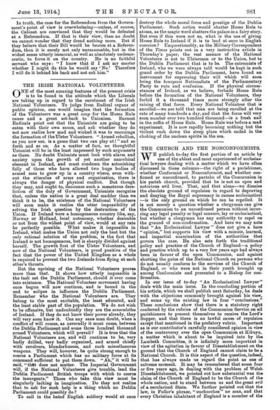TOPICS OF THE DAY.
THE QUESTION OF AREA.
pUBLIC opinion is, we regret to say, growing more and more pessimistic in regard to the possibilities of a peaceful settlement of the crisis caused by the Home Rule Bill. Yet, strange as it sounds, all that now separates the two parties is a question of area. The case has been "pleaded down" to that apparently narrow issue. Though Unionists are not in the least shaken in their belief that the Union is the only fair, the only reasonable, and the only practical way of keeping the political relations between the two islands on a sound basis, and though they feel, further, that the best way to obtain a settlement would be by a direct reference of the Home Rule Bill to the people of the United Kingdom, they are willing as a party to acquiesce, though reluctantly, in the present Bill pro- vided that Ulster is excluded from its operation. On the other hand, the Liberals, with the assent, though no doubt the grudging assent, of the Nationalists, are willing to let any county of Ulster in which there is a local majority against Home Rule exclude itself from the operation of the Home Rule Bill—a proposal which means, in practice, the exclusion of the area comprised in the four counties of Antrim, Down, Armagh, and Londonderry. No doubt originally that proposal was handicapped by the ridiculous provision that Exclusion was only to last for six years, how- ever unwilling the population of the excluded area might still be to go under a Dublin Parliament. There is, however, so general a feeling that the time-limit is " impossible " that we have a right to say that the Liberals and Nationalists are now willing to allow the four counties to exclude themselves for as long as they like. Thus it is seen that the real point in dispute is whether all Ulster or only a part, and if so what part, is to be excluded.
In these circumstances one's first feeling is that the two parties have got so near to a working agreement to avoid civil war that it must be possible by a little further mutual concession to reach actual agreement. It would be perfectly preposterous, it will be urged, to fight over a mere question of area. The matter is clearly ripe for compromise. Unfortunately, though we fully agree that it will be a disgrace if a compromise is not reached, we cannot forget that questions which seem small and narrow to the outsider are often in reality the hardest to settle. In every human transaction it is the last pull upon the rope that is the most difficult, the pull that often proves too much to be accomplished. It sounds a small thing to say that nothing but a question of the area to which the Home Rule Bill is to apply now stands in the way of the prevention of civil war. Nevertheless that barrier may, though we sincerely trust it will not, prove insuperable. If we may once more invoke the man in the street, he would no doubt say that the proper way to settle all such disputes is to split the difference. If the Nationalists say that the excluded area must be the four counties, while the Ulstermen say that it must be all Ulster, why not adopt the suggestion which the Spectator has so often proposed, and make the excluded area the six counties ? We still believe that, assuming Exclusion to be, as we believe it is, the only practical way of avoid- ing civil war, the six counties will prove the best area for Exclusion, and the best bulwark against the oppression of the Protestant and Loyalist population in the rest of Ireland. If the area excluded is the six counties, then it will be an area sufficiently homogeneous and sufficiently Protestant and Loyalist in its characteristics to prevent any serious distraction of opinion within it. The minority of Nationalists within the fort, so to speak, will not be large enough to give trouble. If, on the other hand, the whole of Ulster is taken for the excluded area, the Roman Catholic minority may be large enough to give very serious trouble. The excluded area will have, as it were, a little Roman Catholic Ulster within it.
But though this may be the Spectator's view, it unfortunately does not now seem to be the view of the Ulstermen. Before Ulster had armed, or, indeed, up to within three months ago, it might have been, nay, we believe it would have been, quite possible to get 'Ulstermen to agree to the compromise of the six counties. Now passion has risen so high that the possibility of a compromise on those lines seems to have passed away. The Covenanters within the counties of Donegal, Cavan, and Monaghan are far better armed and organized than they were, and the ties that bind them to the Protestants of the rest of the Province have become very much stricter. In fine, what is called—though we do not for a moment admit the validity of the term—the "desertion" of the Protestants in the three counties just named seems daily more and more impossible to the rest of the Northern Protestants, and they become lees and less inclined to take the line which we have always taken—that in reality, though not in appearance, the most effective way of protecting the Protestants throughout the rest of Ireland will be by the holding of the homogeneous fortress of the six counties. Another influence which has of late arisen to stimulate the demand for excluding the whole province, and for rejecting the notion of the six counties area, is the growth of the National Volunteers, discussed by us on the following page. The growth of these undisciplined organizations has intensified the feeling that the Ulstermen cannot "abandon" the three Ulster counties in which the Nationalists have a marked majority. For ourselves, we greatly regret this change, for the reasons we have given. It would, however, be most foolish to refuse to recognize it merely because we dislike it. We fear, therefore, that if Exclusion is to prevent civil war—and there is nothing to be said in its favour unless it can perform that task— it must now be the Exclusion of the whole of Ulster and not merely of a part.
We shall be told, no doubt, that if the Ulstermen will not now take anything less than the whole of Ulster, Exclusion is doomed, and that, even though the problem has been narrowed down to the question of area, it is still made insoluble by the exaggerated nature of the demands of the Protestants of the North. We are not so sure of this, for, as we have so often said, a good many Nationalists, if driven to some form of Exclusion, are inclined to favour the Exclusion of the whole province rather than of the six counties, for the very same reasons that we dislike the larger Exclusion. They argue that, if there must be Exclusion, they would rather have an area in which they may possibly convert the anti-Nationalist majority into a pro-Nationalist majority than an area, like the six counties, in which such conversion is absolutely impossible. If the Nationalists were to assent to a Referendum being taken in the whole of Ulster as one area, they would feel that they would have the right at some future date to demand another Referendum for the whole area, and that in such a Referendum they might be successful. If, however, we assume that the demand that all Ulster shall be excluded will be absolutely rejected by the Nationalists, and that the Liberals will not feel able to control their allies in this respect, what is to happen ? The Liberals have admitted that they cannot coerce Ulster. Yet if Exclusion does not take place such coercion is necessary under their Bill. They have also told us that they will not consent to a General Election, which is the natural way of solving the problem. There remains, then, if the Liberals are to allow their action to be governed by reason, only the Referendum.
The employment of that last Constitutional resource of a civilized democracy would meet all practical Liberal objec- tions. In the first place, no one can doubt its power as a solvent, or, if you will, as a coercive. Whatever the Ulster- men may say, if the present Home Rule Bill were to be sub- mitted to the votes of the electors, and approved by them, it would have a moral and a physical force behind it which would sweep away all opposition. There is no question, for example, but that the Army would obey the voice of the people thus directly and solemnly expressed. Again, the Unionist Party would abandon any further attempt at opposing the establishment of Home Rule. Next, the use of the Referendum would meet the Govern- ment's plea that they have a large number of other important Bills whichthey allege that theymust pass or introduce before they again appeal to the country at a General Election, as, for example, the Plural Voting Bill and the Bill for the Reform of the House of Lords, and the further legisla- tion which they have foreshadowed in regard to land. If the Home Rule issue were to be submitted for the decision of the country by Referendum, it would remain open for the Government to deal with these measures whichever way the Referendum went.
In truth, the case for the Referendum from the Govern- ment's point of view is overwhelming—unless, of course, the Cabinet are convinced that they would be defeated at a Referendum. If that is their view, then no doubt we cannot wonder that they dread nothing more. But if they believe that their Bill would be beaten at a Referen- dum, then it is surely not only unreasonable, but in the widest sense utterly immoral, as well as absolutely undemo- cratic, to force it on the country. He is no faithful servant who says : "I know that if I ask my master whether I might do this he would say 'No.' Therefore I will do it behind his back and not ask him."











































 Previous page
Previous page